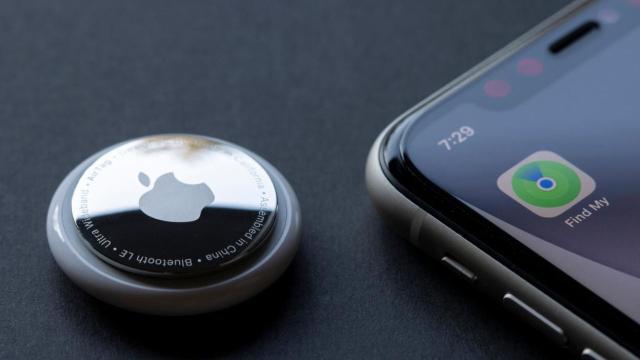AirTags might seem a bit like magic. They’re tiny, fit nicely in backpacks and on keychains, and they can somehow identify where your most important stuff is at all times. Of course, that also might make them seem dangerous, as it appears all too easy for someone to slip an AirTag into your bag or car to track your whereabouts. AirTags are pretty safe to use these days, though: They’re simple trackers that rely on clever tech from Apple to work privately and securely. And if anyone decides to abuse AirTags for nefarious reasons, there are built-in tools to thwart their attempts.
What is an AirTag?
An AirTag is a simple tracker based on Bluetooth, UWB (ultra-wideband), and NFC. It looks like a thick coin, and can be used to track pretty much any object you can attach it to. You can keep it in your backpack, wallet, luggage, pet’s collar, on your Apple TV remote, or with any object you lose frequently. Some have effectively used AirTags to track checked-in luggage when flying. People also use AirTags to check in on their kids—however they’re not always effective for real-time tracking.
How do AirTags actually work?
AirTags don’t have a GPS chip. Instead, they send out Bluetooth signals that can be received by nearby devices that are on Apple’s Find My network. This includes any device signed in to iCloud, such as an iPhone, iPad, or Mac. They can be any device on the Find My network, not just yours, which is why AirTags can be so useful: Anyone’s connected Apple device becomes a beacon for your AirTag. Once those devices connect to the internet, they send an update about your AirTag’s location, which allows you to locate your tagged item. AirTags are useless if they’re in a zone with no network or with no connected device nearby.
You don’t just have to rely on this Bluetooth tracking technology to find your AirTag, either. If you’re in the vicinity of your device, you can go to the Find My app on your Apple device, tap your AirTag, and use Precision Finding to locate it. This works by using ultra-wideband technology to point you in the direction of the tag. Literally: Find My will direct you exactly where to go to find your AirTag, complete with haptic vibrations to note when you’re getting close.
How much are AirTags?
Apple’s AirTags are US$29.99 a pop, but you can get a 4-pack for US$99.99 if you want to save a bit of money. You can also wait for sales, such as the one on Black Friday, to get even better deals on AirTags.
How long do AirTags last?
An AirTag’s battery lasts up to a year; when the battery is close to running out, you’ll get a notification from the Find My app on your iPhone. You can easily replace the battery, too, as Apple uses the affordable standard 3V CR2032 lithium coin battery.
AirTags and privacy
Apple says the entire process of finding an AirTag is anonymous and encrypted to preserve your privacy. Apple doesn’t know which devices relay your location, or where your AirTag is. The AirTag doesn’t store location data or a list of places you’ve been to, either, and the company claims that it doesn’t impact your battery life or data usage.
You can share the location of your AirTag with other people, even if they’re not a part of your iCloud family. This could help with situations where multiple people need to keep an eye on a particular AirTag, such as two owners of a tagged pet.
But let’s discuss the dangers of AirTags: If someone decides to use an AirTag to track your movements, there’s a built-in safety feature to help: When an AirTag is separated from its owner, and finds itself within range of your iPhone or Android phone, your device will warn you an unknown AirTag is near you. You’ll be able to ping the tracker if you don’t recognize it, and deal with it accordingly.
AirTags accessories and engraving
Although AirTags are pretty easy to place anywhere, there are a few use cases where accessories can make things better. For example, you could use an AirTag keychain or holder to make it easier to track keys or other objects. You can also buy AirTags accessories directly from Apple. If you buy your AirTags through Apple, you can also engrave them with up to four characters.
